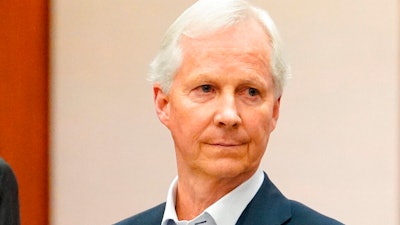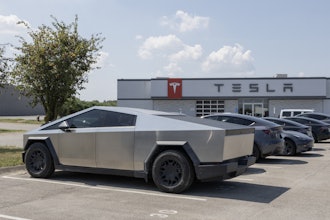
HOUSTON (AP) — The case against the CEO of a chemical manufacturer on trial over a toxic fire at the company’s suburban Houston plant during Hurricane Harvey in 2017 ended Wednesday after the judge concluded that prosecutors had failed to present sufficient evidence to support the charge.
Judge Belinda Hill's ruling ended the case against Arkema Inc. CEO Richard Rowe, but the company and another employee are still on trial.
Rowe had been charged with the reckless emission of an air contaminant related to the blaze at the Pennsylvania-based company’s chemical plant in Crosby, northeast of Houston. The blaze caused organic peroxides made at the facility to catch fire and explode. The fire forced the evacuation of more than 200 residents from the area and sent 21 people, including first responders, to the hospital.
On Wednesday, Hill ruled that prosecutors had failed to provide enough evidence to prove to jurors that Rowe was guilty of what he was accused of doing, said Rowe's attorney, Tim Johnson.
Hill’s ruling came a day after prosecutors rested their case.
Rowe, who lives in Pennsylvania, is relieved the case against him is over because he “didn’t do anything that was wrong in any way, means or manner,” Johnson said.
“This was probably the most ill-conceived prosecution that I have ever experienced in my 35 years practicing law,” he said.
Dane Schiller, a spokesman for the Harris County district attorney’s office, said the ruling “does not change the facts regarding what the company did.”
The trial was set to resume on Thursday, as Arkema and former plant manager Leslie Comardelle each face the same charge Rowe had faced. If convicted, Arkema faces up to a $1 million fine and Comardelle could be sentenced to up to five years in prison.
Prosecutors allege that Arkema, a subsidiary of a French chemical manufacturer, and its employees failed to properly prepare the company’s chemical plant ahead of Harvey’s arrival.
Arkema has argued that the fire was caused by an act of God, which is the hurricane, and could not have been prevented. Harvey dumped nearly 50 inches (127 centimeters) of rain in parts of the Houston area and caused 36 deaths locally.
Legal experts have said that prosecutors could have a difficult time during the trial proving that the actions by Arkema and its employees were willful and reckless.
The U.S Chemical Safety Board said Arkema worked to keep equipment that stabilized its organic peroxides, used to make such things as plastic resins, from losing power. But Arkema didn’t consider flooding of its safety systems “a credible risk,” even though the plant was inside a flood zone.
At the request of prosecutors, Hill earlier this month dismissed felony assault charges against Arkema and now retired vice president of logistics, Michael Keough, that were related to injuries two deputies suffered during the fire. Hill has also sanctioned prosecutors over withholding evidence in the case.
The trial resumed last week following a six-month delay because of the coronavirus pandemic.
Due to the pandemic, the trial is being held in a courtroom that has been set up at NRG Arena, a large exhibition hall that usually hosts concerts and special events including the city’s annual livestock show and rodeo. The public is being allowed to watch the trial through a livestream from a courtroom in the downtown criminal courthouse.






















